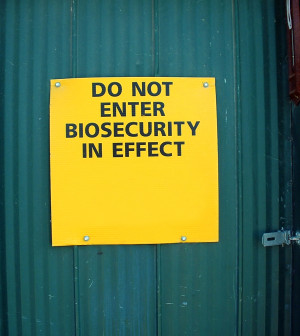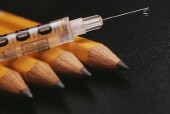- The Best Time of Day to Drink Bone Broth to Maximize Health Benefits
- 8 Ways to Increase Dopamine Naturally
- 7 Best Breads for Maintaining Stable Blood Sugar
- Gelatin vs. Collagen: Which is Best for Skin, Nails, and Joints?
- The Long-Term Effects of Daily Turmeric Supplements on Liver Health
- Could Your Grocery Store Meat Be Causing Recurring UTIs?
- Are You Making This Expensive Thermostat Error This Winter?
- Recognizing the Signs of Hypothyroidism
- 10 Strategies to Overcome Insomnia
- Could Artificial Sweeteners Be Aging the Brain Faster?
Delaying Measles-Related Vaccines May Raise Seizure Risk: Study


Delaying certain routine immunizations past the first 15 months of life could boost the risk of fever-related seizures, new research suggests.
The risk appears very small, and the brief seizures — due to fevers caused by the shots — usually don’t lead to any harm other than shattered nerves in parents. Still, the findings provide more evidence to support not delaying immunizations, said Dr. Simon Hambidge, professor of pediatrics and epidemiology at the University of Colorado in Denver and lead author of the new study.
“It’s one more reason we would recommend following the guidelines,” he said.
The vaccines in question are the combination measles-mumps-rubella and the newer combo immunization for measles-mumps-rubella plus chicken pox (varicella).
The U.S. Centers for Disease Control and Prevention recommends a first dose of either vaccine at 12 to 15 months and a second dose at 4 to 6 years.
As many as 5 percent of kids who get the measles-mumps-rubella shot develop a fever, typically within seven to 10 days, Hambidge said. About 1 in 4,000 doses will cause a fever-related seizure.
But when vaccination is postponed, the risk of fever-related seizure rises twofold, said the study, published online May 19 in Pediatrics.
“If you delay either kind of vaccine until the child is 16 to 23 months, you have roughly a doubling of the occurrence of febrile seizures,” Hambidge said. “But the risk is still really low.”
The seizures only last one to two minutes, causing an altered state of consciousness, trembling and possible loss of bladder and bowel control, he said. Typically, the seizures have no lasting effect.
Parents put off vaccinations for various reasons. About 10 percent of parents are “hard-core refusers” who are extremely skeptical of vaccinations, Hambidge said. Many other parents don’t follow guidelines about vaccination timing, perhaps because of lack of health insurance or transportation, the study noted.
The researchers wanted to know if babies whose vaccinations were delayed were more likely to develop fever-related seizures.
To get answers to their questions, the researchers studied vaccination records of over 323,000 U.S. children from 2004 to 2008.
The timing of vaccinations during the first year of life didn’t affect seizure rates. But delaying a measles-mumps-rubella immunization until 16 to 23 months boosted the risk of seizure from about 1 in 4,000 doses to 1 in 2,000 doses, Hambidge said.
For the vaccine that also wards off chicken pox, the rate grew from 1 in 2,000 doses to 1 in 1,000 doses, he said.
What’s going on? It’s possible, Hambidge said, that the immune systems of the older children are stronger, allowing them to develop fevers to fend off the weakened germs in the vaccines. The fevers can then lead to seizures.
Seizures in young children are common, said Dr. Geoffrey Weinberg, professor of pediatrics at University of Rochester School of Medicine and Dentistry in Rochester, N.Y.
“They occur in as many as 2 to 5 percent of children by age 5, most commonly at 16 to 18 months of age,” Weinberg said. “They can be very scary and often result in medical care visits, but, for the vast majority, have no long-term effects.”
Whatever the risk of seizures, Weinberg said it’s important to get babies immunized on time so they’ll be protected against measles, mumps, rubella and chicken pox. These potentially serious childhood diseases are very contagious.
As of May 9, 2014, 187 people in the United States have been diagnosed with measles this year, according to the Centers for Disease Control and Prevention. Dr. Anne Schuchat, director of the National Center for Immunization and Respiratory Diseases, said that’s “the most measles cases reported in the first four months of the year since 1996.” Most of those sickened hadn’t been vaccinated.
More information
For details about immunization schedules, see the Centers for Disease Control and Prevention.
Source: HealthDay
Copyright © 2026 HealthDay. All rights reserved.










